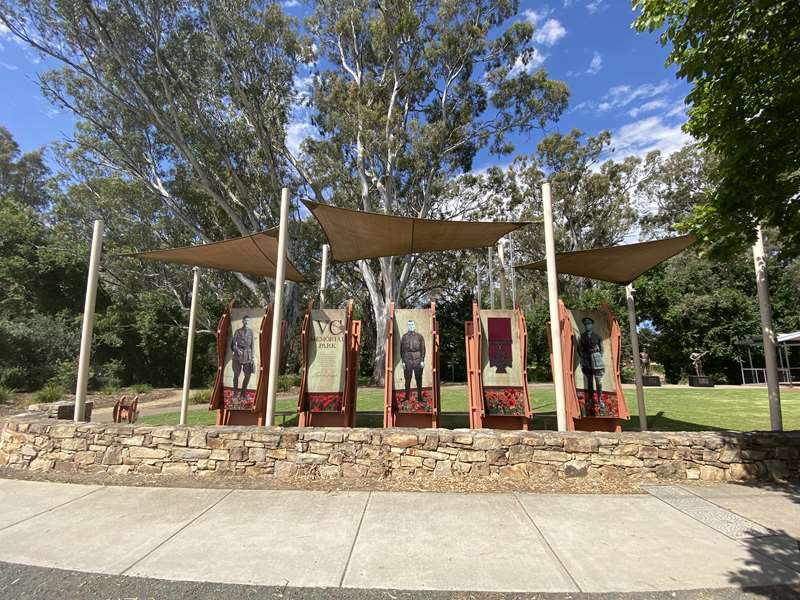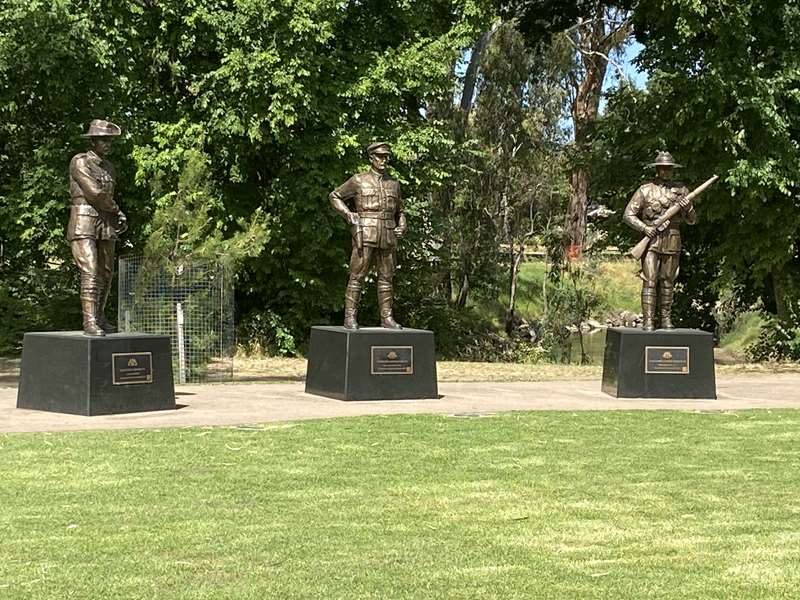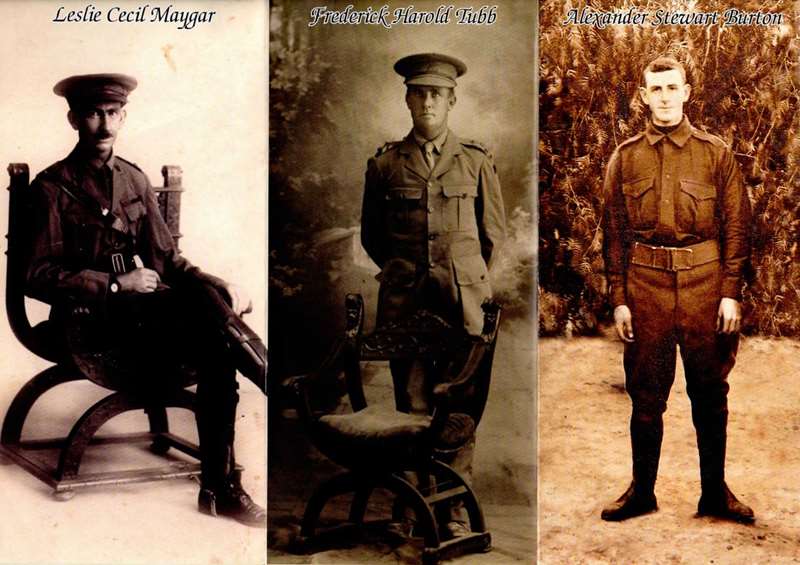Euroa - Victoria Cross Memorial Park


Three plinths with bronze statues and plaques commemorate Victoria Cross recipients from the Euroa district. Euroa is the only place in Australia that has three men who have been awarded the Victorian Cross.

Lieutenant (later Major) Frederick Tubb and Corporal Alexander Burton won their Victoria Crosses in the Lone Pine trenches at Gallipoli in August 1915 repelling a Turkish counter-attack - Burton was killed in the attack and awarded his medal posthumously. Tubb died on the Western Front in France two years later.
Lieutenant Maygar won his Victoria Cross rescuing a comrade under heavy fire during the Boer War in 1901 and was later killed in action during World War One.
Located at the eastern end of Brock Street next to the Seven Creeks.

LESLIE CECIL MAYGAR VC
Born 27 May 1868
Killed In Action 1 November 1917
Leslie Cecil Maygar (1868-1917) was born on 27 May 1868 at Dean Station, Kilmore. He was the seventh child of Edwin, grazier, and his wife Helen. Both were from Bristol, England. He was named Edgar Leslie Cecil Willis Walker Maygar. Leslie was educated at Alexandra and Kilmore State schools and privately. He was nearly 6ft (183 cm), and had a Kitchener moustache. Leslie, his father and three brothers owned 'Strathearn' station at Ruffy.
By the time he was 25 Leslie had discovered the Victorian Mounted Rifles. It is the 'Rifles' that absorbed much of his free time. It is possible he had been a member of the armed forces since 1891. He claimed as much on his attestation papers.
On 13 August 1900, Leslie was a commissioned probationary Lieutenant. He was originally rejected for the Boer War because he had a hollow tooth. None the less Leslie ended up as a subaltern in the 5th Victorian Mounted Rifles and in 1901 found himself sailing for South Africa.
On 23 November 1901, at Geelhoutboom, South Africa, Leslie saved the life of Arthur Short, winning the VC as a consequence. Leslie galloped under fire to assist a group of men struggling to hold an outlying -post as they were being outflanked. Leslie ordered them to retire. The horse carrying Arthur Short was shot under him. With the enemy just 180 metres away, Leslie dismounted and lifted Arthur onto his own horse, which then bolted into boggy ground, causing both of them to dismount. On freeing the horse and finding that it could not carry both, Leslie again put Arthur on its back and told him to gallop for cover. Leslie followed on foot. All this took place under a very heavy fire.
Leslie received his VC from Lord Kitchener.
Resuming work as a grazier at Ruffy, Leslie also served in the 8th (later 16th) Light Horse, V.M.R. He enlisted in the AIF soon after WW I broke out, lowering his age by four years. On 20 August 1914 he was appointed a Captain in the 4th Light Horse Regiment and sailed for Egypt in October. In Gallipoli, with the dismounted light horse, he was promoted to Major. On 17 October 1915 he was given temporary command of the 8th L.H.R., both rank of Lieutenant-Colonel and command being confirmed in December.
Leslie led his regiment throughout its service in Sinai and Palestine.
Late on the day of the Battle of Beersheba, 31 October 1917, Leslie came under fire from a German aeroplane shattering his arm. His horse bolted into the darkness and was found later by 8th Regiment troopers but Leslie was not with the horse. He was picked up during the night by other troops and having lost too much blood, died the next day at Karm, Jordan.
Besides the VC, Leslie was also awarded the Distinguished Service Order, Volunteer Officers Decoration (for long and meritorious service), Brevet Major and was mentioned in Despatches three times.
Maygar's Hill just north of Longwood is named in Leslie's honour. The Hume Freeway passes over this hill.
FREDERICK HAROLD TUBB VC
Born 28 November 1881
Killed In Action 20 September 1917
Frederick Harold Tubb (1881-1917), soldier and grazier, was born on 28 November 1881 at Longwood, Victoria. He was the fifth child of Harry Tubb, teacher, and his wife Emma Eliza.
After leaving school Fred managed the family farm; he later worked his own land. He was 5 ft 5 3/4 ins (167 cm) tall, an extrovert and a born leader. After volunteer service with the Australian Light Horse (1902-11), he joined the 60th Battalion, Australian Military Forces, and was commissioned second lieutenant in 1912. He transferred to the 58th Battalion in 1913.
Fred was appointed to the AIF on 24 August 1914 as a second lieutenant in the 7th Battalion. Fred viewed the landing at Gallipoli from the boat 'Galeka'. He finally stepped foot on Gallipoli on 6 July. He was Gazetted captain on 8 August the same day he took over a vital sector of a captured trench at Lone Pine with orders to "hold it at any cost".
Early on 9th August, the Turks launched a furious attack, advancing along a trench which had been barricaded with sandbags. From the parapet Fred fired at the enemy; corporals Wright and Webb in the trench caught enemy bombs and threw them back or smothered them with greatcoats. Wright was killed when clutching a bomb which exploded in his face. Webb lost both hands catching bombs. He retired to Brown's Dip where he died. Several bombs exploded together and four men were killed. A fifth was "knocked" down. Fred was wounded on his face and arms. The barricade was repeatedly wrecked and rebuilt. Fred, at one stage, was blown from the parapet all along inspiring his men, joking and shouting encouragement.
Wounded in the arm and scalp, Fred was left with Alex Burton and Bill Dunstan. Fred provided covering fire while the barricade was rebuilt. Another bomb burst killed Alex and temporarily blinded Bill Dunstan. Fred then obtained additional help, but the Turks did not renew the attack.
Fred was sent home after spending time in hospital at Malta and England.
In March 1916 Fred returned to Longwood. He was greeted with all the pomp and circumstance the town could muster. Fred was determined to return to France "and after numerous examinations, he finally convinced the medical board he was fit to return to the front. Fred left Melbourne in October 1916 and rejoined his beloved 7th Battalion in France, two months later.
Fred was prevented from fighting and limited to duties behind the front line. His injuries were still obvious. With the support of the commander of the 2nd army, General Plummer, Fred was allowed to lead his men in battle one more time. He spoke with the senior men in his company telling them he had accepted he was not physically up to the task and this was to be his last battle. On Wednesday 12 September he handed over his beloved diary to his brother Frank for safe keeping. On the 20 September he was killed in action at the Menin Road, Belgium.
The Tubb line continues to this day in the District.
ALEXANDER STUART BURTON VC
Born 20 January 1893
Killed In Action 9 August 1915
Alex (1893-1915) was born at Kyneton Victoria. He came with his family, firstly to Benalla and when a job was offered to his father at the Alex Miller Stores in Euroa they moved there. As a young boy Alex attended Euroa State School and then went on to work in the store. In 1912 Alfred Burton became a partner in the Euroa business and about 1928 the Burton family purchased the business in their own right and still trade today from the same location.
Alex missed the landing at Gallipoli being ill with a sore throat. His good friend Esmond Carrick died at the landing. A week later Alex joined the 7th Battalion and was thrust into battle. He survived the fighting near Plateau 400 and the madness of the charge at Krithia, well to the south of Anzac Cove. He also served at Monash Alley and Steeles Post. Alex was slightly wounded and mentioned in despatches:-
"For having volunteered and taken part in the forcing of the sap head D21 in the face of the enemy was appointed Lance Corporal."
Before Lone Pine he was frequently mentioned in soldiers' letters for various brave deeds. He was lucky. By May 22, 35 officers and 773 ordinary ranks had been killed, wounded or missing from his Battalion.
There was much written about Alex and Fred Tubb in the local press after they were awarded the VC. The Burton family carried the loss with dignity. An extract from *The London Gazette*, No. 29328, dated 15th October 1915, records the following:-
For most conspicuous bravery at in the Lone Pine trenches in the Gallipoli Peninsula on the 9th Aug., 1915. "In the early morning the enemy made a determined counter-attack on the centre of the newly captured trench held by Lieutenant Tubb, Corporals Burton and Dunstan, and a few men. They advanced up a sap and blew in a sandbag barricade, leaving only one foot of it standing, but Lieutenant Tubb, with the two corporals, repulsed the enemy and rebuilt the barricade. Supported by strong bombing parties, the enemy twice again succeeded in blowing in the barricade, but on each occasion they were repulsed and the barricade rebuilt, although Lieutenant Tubb was wounded in the head and arm, and Corporal Burton was killed by a bomb while most gallantly building up the parapet under a hail of bombs."
After the war the Burton family requested they be allowed to put a lead light window in the Presbyterian Church to the memory of Alex and those others who fell. It is still there today, a visible memorial of great and terrible events.
Burton's Bridge over the Seven Creeks in Euroa is named in Alex's honour. It is believed the Victoria Cross lay in a drawer, in the office at the family run supermarket for many years. It has since been donated to the Australian War Memorial.
Alex is remembered with honour on the LONE PINE MEMORIAL. There is no known grave for Alex Burton. The Burton line continues to this day in the District.
Located at the eastern end of Brock Street.
Photos:
Location
1 Brock Street, Euroa 3666 Map
Web Links
→ Military History Trail











